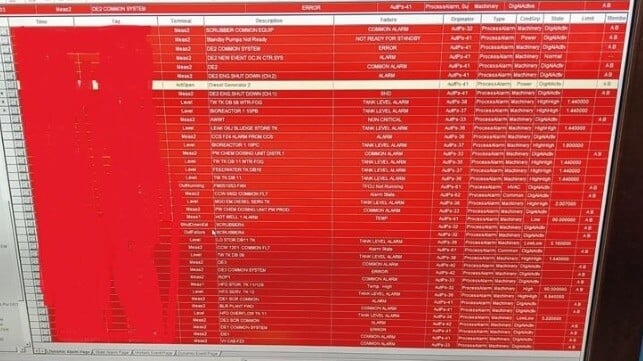New Digital Systems Bring More "Alarm Fatigue" for Mariners

New research by Lloyd's Register confirms a phenomenon that confounds merchant mariners: alarm fatigue. LR examined comprehensive data on bridge and engine room alarms, and the class society found that over the past two decades, the frequency of bridge alarms while on open ocean transits has increased by 197 percent. If unmanaged, the cacophony of audible and visual alerts could distract and irritate the mariner, leading to poor decisionmaking in critical moments.
LR gathered data from 15 ships and gathered input from 65 officers who served aboard them, including both deck and engineering personnel. The data logs were compared with the officers' own subjective experience of the impact of frequent alarms on their daily duties.
Over the course of this survey, the research team found rates of up to 74 bridge alarms per hour (for one situation involving lots of crew attention). "With a peak rate of 74 alarms per hour, the watchkeeping officer would have to read, acknowledge, analyze, decide, and act on an alarm more than once a minute," noted the authors. "In fact, [this crew] had abandoned using the alarm system and with good reason."
In the engine room, some vessel classes saw an average of 2,500 machinery alarms every day. Peak engine room alarm rates hit 22,500 instances in 24 hours, or nearly a thousand per hour.
In worst case scenarios, excess alarms can distract the crew to the point that they miss critical information, resulting in unwanted consequences (like a minor grounding, in one case examined by an LR surveyor).
"Even for foreseeable abnormal or demanding conditions such as losing electrical power or navigating through traffic separations, numerous watchkeepers reported being flooded with alarms," the authors found. "At such times, only ~25% of all officers report that alarms never or rarely 'come in too fast for them to take them in.'"
LR put the responsibility for the excessive number of alarms on the industry's rapid digitalization. There are no regulations on what kind of fault qualifies for an alarm to demand attention from the crew, and as new digital systems proliferate, more new alarms arrive on board.

that matters most
Get the latest maritime news delivered to your inbox daily.
"This investigation reveals the unintended consequences of many uncoordinated alarm requirements being assembled together in a ship system. There is an obvious need for some alarms but confusion regarding necessary actions or uncertainty regarding root causes can lead or contribute to serious incidents," said LR head of technology Duncan Duffy.
With funding from the Danish Maritime Fund, LR and its partners have launched a task force to study alarm systems and methods of managing excessive alarm volume. As is common for maritime innovation, they will look to other industries for examples of successful management strategies.
